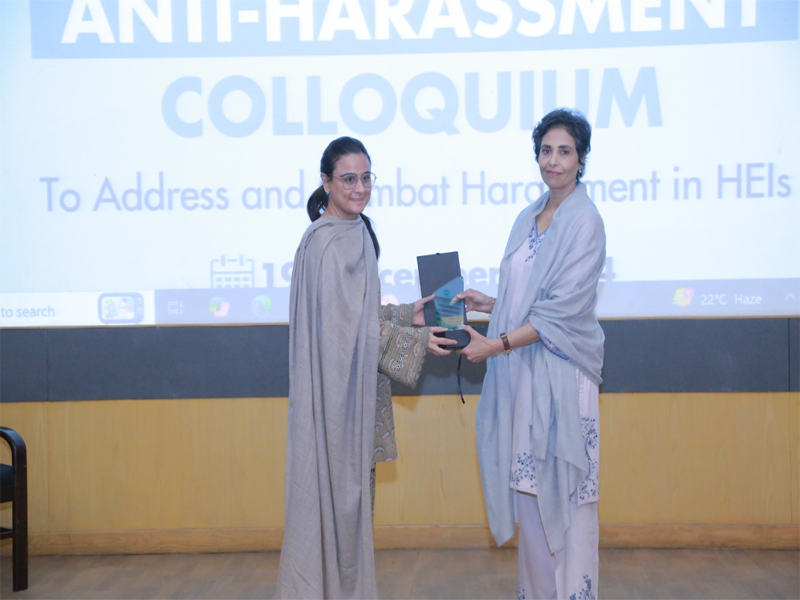SAFE Colloquium advocates strengthening anti-harassment frameworks across higher education in Sindh

- 114
- 0
KARACHI: “Harassment is an enduring and pervasive issue that not only threatens the safety and dignity of individuals but also obstructs their ability to succeed and flourish in academic and professional environments.
The issue is especially critical in societies where women face greater barriers to accessing equal opportunities, and harassment further restricts their freedoms. However, in regions where women enjoy greater economic independence, harassment is less prevalent, or at least more readily confronted through accessible reporting and resolution channels,” said Ms. Fauzia Viqar, the Federal Ombudsperson for Protection Against Harassment of Women at the Workplace, Government of Pakistan.
She shared these insights as the chief guest at the SAFE Anti-Harassment Colloquium to address and combat harassment in higher education institutes, hosted at Ziauddin University, where universities from across Sindh gathered to address these critical concerns. The purpose of the SAFE Colloquium was to evaluate the progress made in strengthening anti-harassment frameworks in higher education institutions throughout Sindh, while also offering actionable recommendations to further this cause.
This initiative, carried out in collaboration with the Association of Commonwealth Universities (ACU), Martha Farrell Foundation, Sindh Higher Education Commission (HEC), and UNDP Pakistan, has united 25 universities in an ongoing effort to foster safer, more inclusive academic and professional spaces. Ms. Fauzia Viqar went on to state, “The Secretary-General of the United Nations recently highlighted that if we continue at our current pace, gender equality will only be achieved in 134 years.” She referenced a recent World Bank report which identified safety concerns related to harassment in public and professional spaces as one of the leading contributors to gender inequality. Mr. Moinuddin Siddiqui, Secretary of the Sindh Higher Education Commission, served as the guest of honor and emphasized the importance of starting anti-harassment education at home. He remarked, “Harassment awareness begins at home. It is our responsibility to teach our sons to respect women and uphold their dignity. The Dean of the Faculty of Law, Politics, and Governance at Ziauddin University shared several key policy recommendations with the Sindh Higher Education Commission (SHEC) and the Higher Education Commission (HEC).
These proposals called for expanding the legal definitions of harassment to include gender-based discrimination and cyberbullying, fostering inclusive campus cultures, and integrating anti-harassment training with clear behavioral expectations. Additionally, the recommendations advocated for the establishment of confidential reporting mechanisms, enhanced transparency in processes, robust victim support systems, and data-driven assessments to ensure ongoing progress. These measures, if implemented, would mandate higher education institutions to adopt comprehensive frameworks, allocate sufficient resources, and enforce strict accountability to ensure safe and equitable academic environments for all. Dr. Zulfiqar Umrani, Director of ORIC at Ziauddin University, presented concerning statistics during his talk on the SAFE initiative's progress, highlighting the pervasive underreporting of harassment incidents due to cultural stigma, fear of retaliation, and gossip.
Referencing the Global Gender Gap Report 2024 by the World Economic Forum, he drew attention to Pakistan’s alarming rank of 145th out of 146 countries, emphasizing the urgent need for robust anti-harassment policies and training programs. He noted that institutions adopting such measures achieve significantly higher complaint resolution rates, reinforcing their importance. Dr. Umrani further highlighted the economic benefits of gender equity, citing research that suggests closing the gender gap in labor force participation could lead to a one-off 30% boost in Pakistan’s GDP, illustrating the transformative potential of empowering women in the workforce.
In her welcome address, Prof. Dr. Nida Hussain, Pro-Chancellor, Ziauddin University and Project Lead for the SAFE initiative underlined the project's overarching significance, saying, “The SAFE initiative represents not just a project but a steadfast commitment to cultivating safer and more inclusive academic environments where every individual has the right to learn and work free from harassment.” She expressed gratitude to the project's partners, students, and faculty for their invaluable contributions and called for sustained efforts to ensure safety and dignity for all across academic institutions. The panel discussion featured a range of distinguished speakers, including Ms. Sabika Shah, Regional Head for Sindh at FOSPAH; Dr. Qudsia Hassan, Chairperson of the Anti-Harassment Committee at Ziauddin University; Dr. Huma Bhukari, Vice-Chancellor of Newport University; Aniqa Tariq, a student at Ziauddin University; and Dr. Zulfiqar Umrani, Director ORIC.
The panelists discussed the key barriers to addressing harassment, such as a lack of awareness, distrust in existing reporting mechanisms, and a low number of complaints. They reiterated Ziauddin University’s zero-tolerance policy toward harassment, irrespective of gender, and emphasized the importance of comprehensive awareness campaigns and the rigorous enforcement of policies.

















































